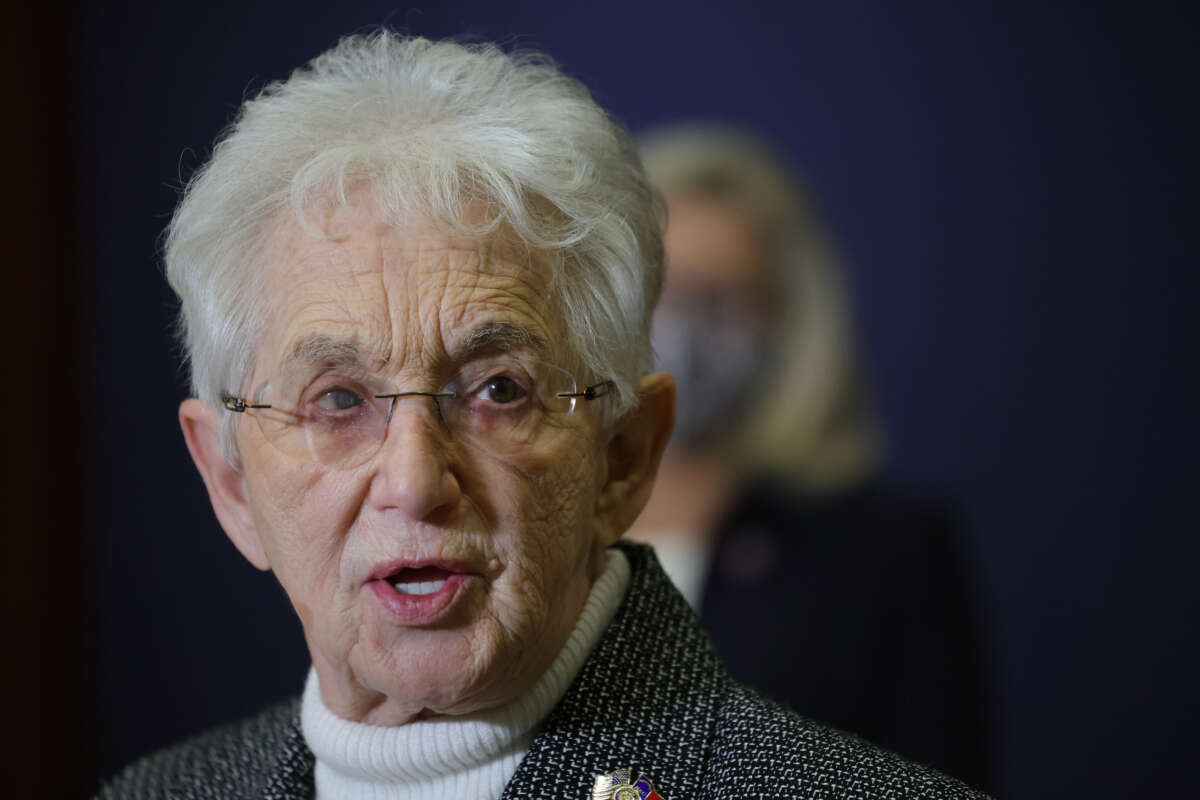Rep. Virginia Foxx of North Carolina is a vocal opponent of the Biden administration’s student debt relief plan and has said she would shutter the Department of Education if given the chance. Foxx has led the Republican minority on the House Committee on Education and Labor since 2017 and is the top candidate to chair the committee when the GOP majority takes over next year.
Due to term limit rules, Foxx received a waiver this week from the Republican steering committee to run for chair. Rep. Tim Walberg of Michigan is currently challenging Foxx for the gavel. Both Republicans support charter schools and the privatization of public education, and they regularly attack teachers’ unions and organized labor in general. The House GOP’s steering committee is expected to announce committee chairs in the next few weeks.
“If installed as chair of the House Education and Labor Committee, Foxx has made clear her top priorities are defunding the Department of Education, keeping students saddled with … student debt and lining the pockets of corrupt for-profit colleges,” said Zac Petkanas, senior adviser to the House Accountability War Room, in a statement.
The House Accountability War Room is an independent group of Democrat-aligned strategists that recently formed to keep tabs on extremists in the new House majority. Progressives say tensions between the House GOP’s far right flank, still bristling with MAGA energy and hungry for revenge, and the party establishment over the next two years will reveal to voters just how extreme Republicans have become under the influence of former President Donald Trump and his base of supporters.
Congressional Republicans did not release a platform and were wary of discussing the specifics of their agenda ahead of the midterms, opting instead to make the election a referendum on President Joe Biden.
“Her extreme MAGA positions — which put the interests of the massively wealthy above those of everyday Americans — are an indication of the dangerous level of extremism we can expect from the new House majority across all committees,” Petkanas added.
Foxx hails from a conservative district in North Carolina, and her views reflect those of state-level right-wing activists who have lashed out at educators since schools closed during the pandemic. The so-called parental rights movement demands censorship of LGBTQ and racial justice materials in school libraries and curricula while pushing for voucher programs that would direct funding from public schools to private schools.
Foxx, apparently one of the most vocal members of the House, has told conservative news outlets that she would abolish the federal Department of Education given the chance.
“If the Lord put me in charge, I would do it,” Foxx told Real Clear Politics in 2017.
Foxx was a staunch ally of Trump’s education secretary, Betsy DeVos, the billionaire champion of school privatization who said the department she ran should not exist. Sen. Bernie Sanders once called DeVos the “worst education secretary in the history of America.”
Abolishing the Department of Education has been a quixotic goal for Republicans since the department was created four decades ago. Achieving this goal has proven to be a deeply complicated and so far impossible task that would open up Republicans to intense attacks from Democrats and the left.
Public support for the department is largely divided along partisan lines, and the relatively tiny federal agency manages massive student loan and grant programs, collects data on schools nationwide, and looks out for the civil rights of marginalized and disabled students — at least when Republicans like DeVos are not in charge.
The Department of Education may get some lip service from the House if Foxx chairs the committee, but student loan forgiveness would clearly be a target. Foxx is a vocal supporter for the lawsuit that has held up Biden’s student debt cancellation plan in court, saying in a statement that Biden “will say and do anything to appease his radical progressive base.”
Foxx’s press team did not respond to Truthout’s request for comment on Friday.
A recent poll found that 77 percent of voters between the ages of 18 and 29 say the student debt relief plan motivated them to vote in the midterms, when the long-expected “red wave” of GOP victories failed to materialize. With a Democratic majority in the Senate, it’s unlikely that legislation from Foxx’s committee would make it to the president’s desk. Still, if committees debate bills sponsored by the party’s far right, leaders like Foxx will be under pressure to live up to previous statements aimed at the MAGA base.
Media that fights fascism
Truthout is funded almost entirely by readers — that’s why we can speak truth to power and cut against the mainstream narrative. But independent journalists at Truthout face mounting political repression under Trump.
We rely on your support to survive McCarthyist censorship. Please make a tax-deductible one-time or monthly donation.
